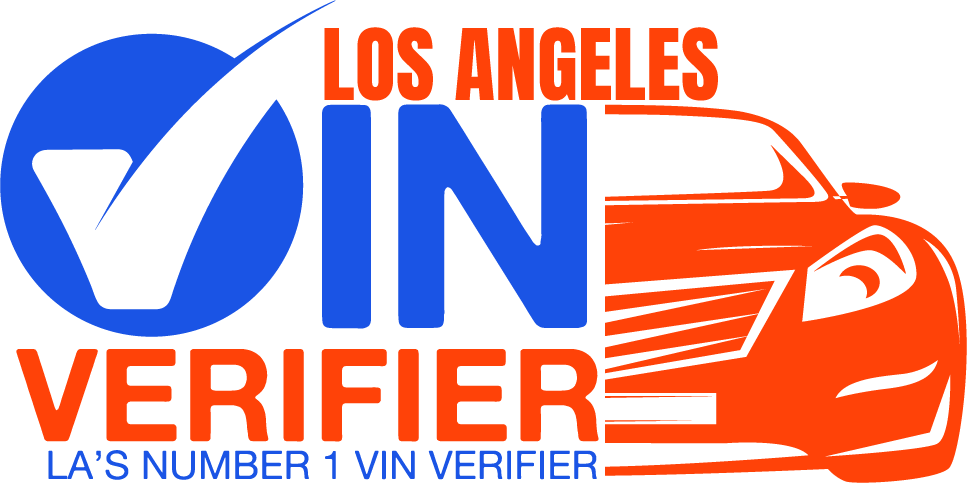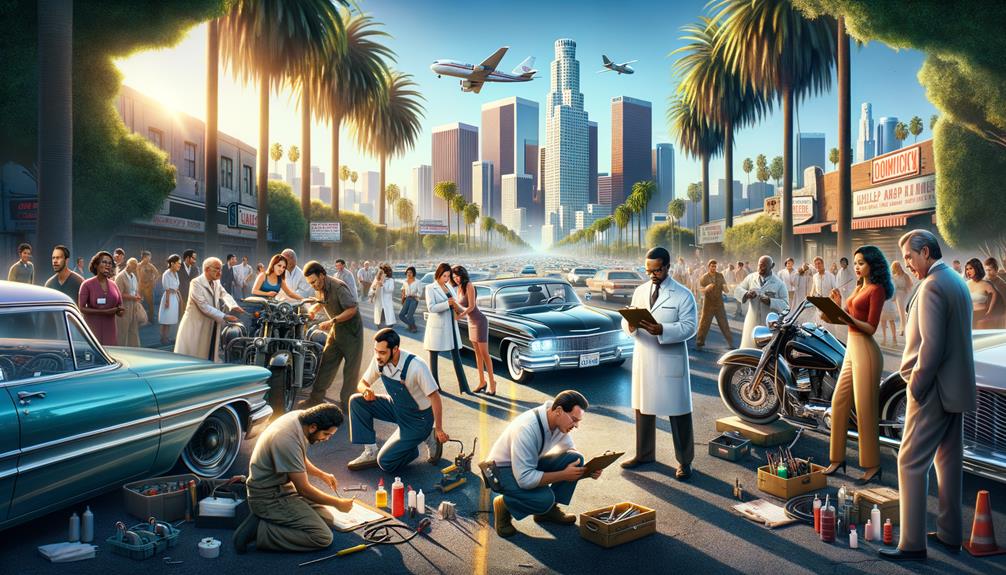When you're in Los Angeles and gearing up to register or buy a vehicle, you might not immediately think about the importance of VIN verification, but it's crucial. The Los Angeles VIN Verifier ensures your vehicle isn't just safe to drive; it also helps in confirming that the vehicle you're investing in is legitimate and hasn't been involved in any fraudulent activities. Whether you opt for a free service at local DMV and CHP offices or a private verifier, understanding their role and how they impact your vehicle's registration process is vital. But how exactly do these verifiers safeguard your vehicle, and what should you look out for to ensure a smooth verification process?
Understanding VIN Verification
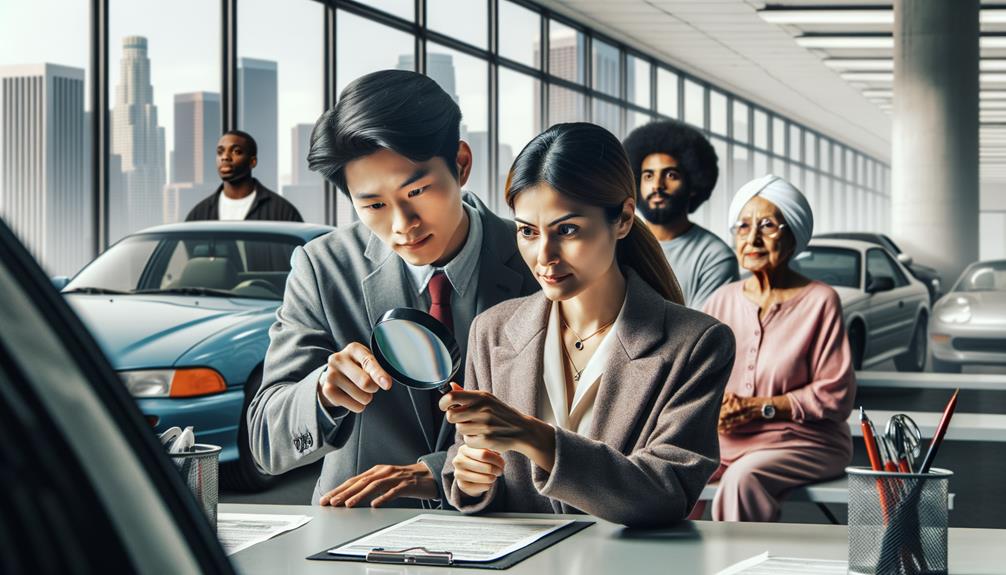
VIN verification is a crucial step in confirming a vehicle's identity and ensuring it meets California's registration requirements. When you're bringing a vehicle from another state or re-registering a salvage in California, you'll need to go through this process. The DMV, or alternatively, licensed private VIN verifiers, handle this task to maintain the integrity and legality of vehicle registration.
During the VIN verification, the verifier checks and records your vehicle's VIN number, odometer reading, body type, make, model, year, and emissions label. All these details are documented meticulously on the REG 31 form. This form acts as the official record that your vehicle complies with all the necessary guidelines and regulations set by the state.
You might be wondering why this level of documentation and inspection is necessary. It's all about preventing vehicle fraud and theft. By ensuring that all information is accurate and matches official records, the DMV and private verifiers help protect you from potential legal issues and financial losses.
It's a safeguard that benefits everyone by upholding the standards of vehicle ownership and registration in California. So, you're not just checking a box; you're ensuring your vehicle's legitimacy on California roads.
Authorized Verifiers in LA
Now that you understand the importance of VIN verification, let's explore the authorized verifiers available in Los Angeles. You've got a variety of options depending on your needs and preferences.
First off, DMV employees are a reliable choice. They provide VIN verification services at no cost, which is great if you're looking to save some money. However, keep in mind that you might face longer wait times due to their busy schedules.
Alternatively, you can turn to CHP officers. They also offer free verification, but you'll need a referral and must schedule an appointment. This could be a bit more cumbersome, but it's a thorough option if you're not in a rush.
For AAA members, VIN verification is readily accessible through AAA employees. Remember, though, you'll need to pay a membership fee to utilize their services. This could be a convenient choice if you're already a member and value the additional services they offer.
Lastly, private VIN verifiers in Los Angeles are available for a fee. They're perfect if you're in a hurry and need quick service. While there's an expense involved, the convenience and speed might just be worth it for your situation.
Common Reasons for Verification
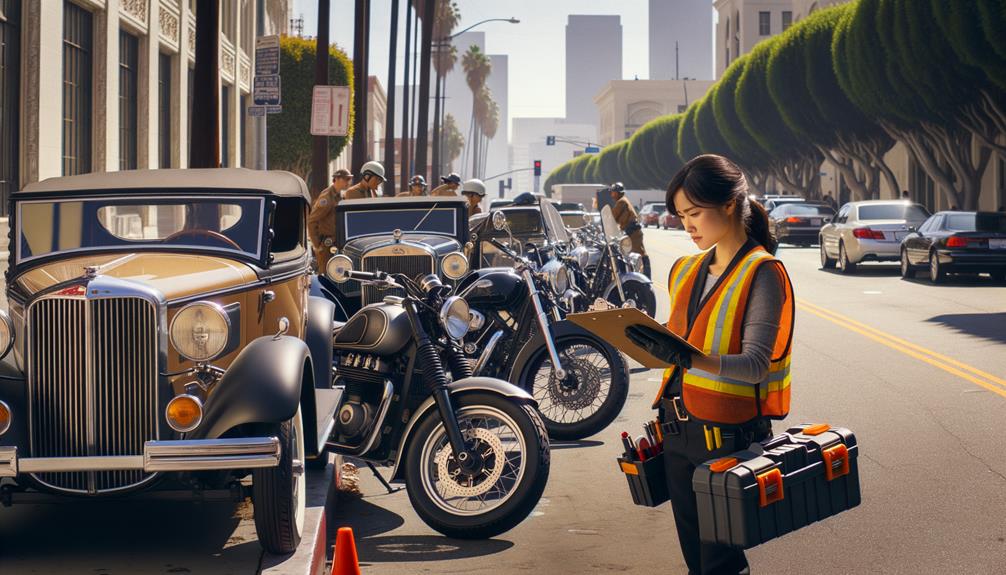
You'll need VIN verification for various reasons, including registering out-of-state vehicles or trailers in California to ensure they meet local regulations. This process, conducted through a physical inspection by the DMV or authorized agents, is crucial for a variety of scenarios.
Here are some common reasons you might require VIN verification:
- Out-of-State Vehicles: If you're bringing a vehicle from another state, VIN verification ensures it complies with California's safety, emissions, and anti-theft standards.
- Changes in Vehicle Configuration: Modifying your vehicle significantly, like converting a bus into a motorhome, necessitates a re-evaluation to keep your registration details accurate.
- Alteration in Fuel Type: Switching your vehicle's fuel type requires re-verification to ensure it meets current environmental regulations.
- Post-Lien Sale Verification: After a lien sale, VIN verification helps confirm the new ownership and that the vehicle description matches DMV records.
Understanding these requirements can save you time and help avoid potential complications with vehicle registration or use.
Cost Analysis of VIN Services
Considering the costs associated with VIN verification, it's important to know that services conducted by the DMV and CHP are free.
Private verifiers, on the other hand, typically charge a fee. When you're dealing with VIN verification on salvage vehicles, opting for DMV or CHP becomes a particularly cost-efficient choice since they handle these checks free of charge. This not only saves you money but also ensures compliance with state regulations without the added financial burden.
Private VIN verifiers offer a service that, while costing more, can expedite the verification process. This is especially useful if you're in a rush or can't align your schedule with the free services' more limited availability.
Comparing Verification Providers
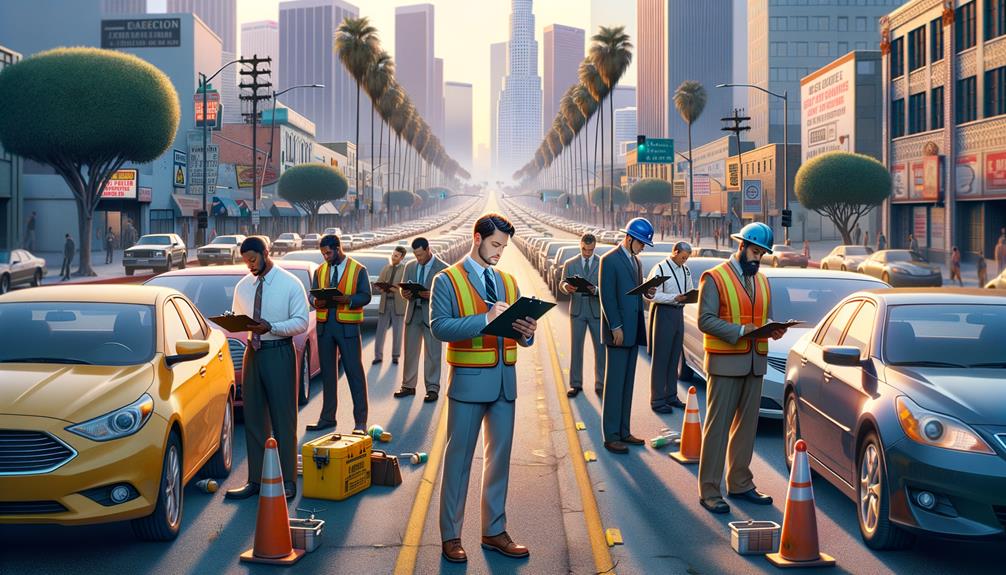
When comparing VIN verification providers, consider the availability, cost, and specific services offered by the DMV, CHP, AAA, and private verifiers. Each option has its unique benefits and limitations, which can impact your decision based on your specific needs.
California Highway Patrol (CHP): Offers free verifications but requires appointments and referrals. Best for verifying salvage or junked vehicles, which can't be handled by AAA or private verifiers.
Department of Motor Vehicles (DMV): Provides cost-free VIN verification at designated locations without the need for travel. However, their services are limited to basic verifications, similar to the CHP.
AAA: Available for AAA members who might face additional fees. Their service is convenient but generally limited to straightforward cases and doesn't include salvage or junked vehicles.
Private VIN Verifiers: Charge varying fees based on distance and the complexity of the service. They're typically the quickest and most flexible option, offering services at your location.
Each provider has distinct advantages depending on your circumstance. You'll need to weigh these factors to choose the best verifier for your VIN number needs.
Registration Procedures Overview
To successfully register your vehicle in California, you must first complete a physical inspection that includes VIN verification, odometer reading, and documentation of important vehicle details.
This initial step is crucial, especially if you're registering a vehicle or trailer that was last registered out of state or has undergone significant modifications.
For a QUICK VIN VERIFICATION, you'll need to locate a service licensed to complete this task. These providers perform a VIN check and ensure all your documentation aligns with state requirements.
Remember, the DMV or an authorized verifier like Los Angeles VIN Verifier can handle this for you. They'll fill out the necessary REG 31 form, which is vital for the process.
When you're ready to proceed, gather all required documents and head to your nearest DMV or CHP office. Having your paperwork ready and ensuring it's complete can significantly speed up the registration process.
It's essential to avoid any setbacks that might arise from missing or incorrect information. This streamlined approach not only saves you time but also helps you comply with state regulations efficiently.
Vehicle Verification Requirements
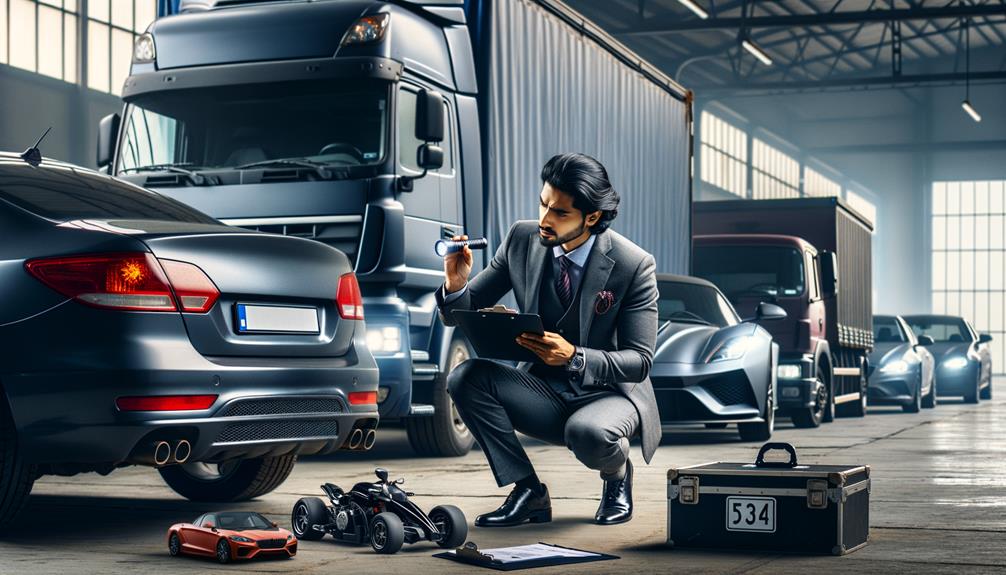
You'll need a thorough physical inspection to meet California's vehicle verification requirements. Whether you're registering an out-of-state vehicle or dealing with salvage situations, the process ensures your car complies with all legal standards. Here's what you need to focus on:
- VIN Verification: This is crucial for confirming details like the VIN, odometer, and emissions label. Make sure the inspection is done meticulously.
- REG 31 Form: All verified information must be recorded on this form, which is then processed by the DMV. Ensure every detail is accurately captured.
- Authorized Verifiers: Only authorized personnel, including DMV officials, CHP officers, or licensed private VIN verifiers, can conduct these inspections.
- Service for Out-of-State Vehicles: If you're bringing a vehicle from another state, VIN verification is mandatory. Consider using private VIN verifiers if you seek convenience and quicker service.
Choosing the right verifier can streamline the entire process, ensuring you meet all regulatory requirements without any hassle.
Challenges in Vehicle Registration
Navigating vehicle registration in Los Angeles presents several challenges, particularly due to frequent discrepancies in VIN documentation. When you're dealing with VIN verifications, it's crucial that every detail matches up perfectly. Any mismatch or error can delay the entire registration process, forcing you to undergo additional inspections and sort out the discrepancies.
For instance, if you're bringing a vehicle from out-of-state, California mandates a VIN verification to confirm vehicle ownership and prevent fraud. This step is vital but can add time and complexity to your registration journey. Similarly, dealing with salvage vehicles introduces another layer of complexity. These vehicles must pass a VIN verification to ensure they meet state regulations before they can be re-registered. This often means a more rigorous examination and potentially more paperwork.
The physical inspection requirement can also be a hurdle. You might find yourself needing to transport your vehicle to a verification facility, which isn't always nearby. Furthermore, issues like incomplete paperwork or missing emissions labels can lead to outright registration denials.
It's essential to prepare thoroughly and ensure all your documents are in order before initiating the registration process to avoid these pitfalls.
Special Vehicle Regulations
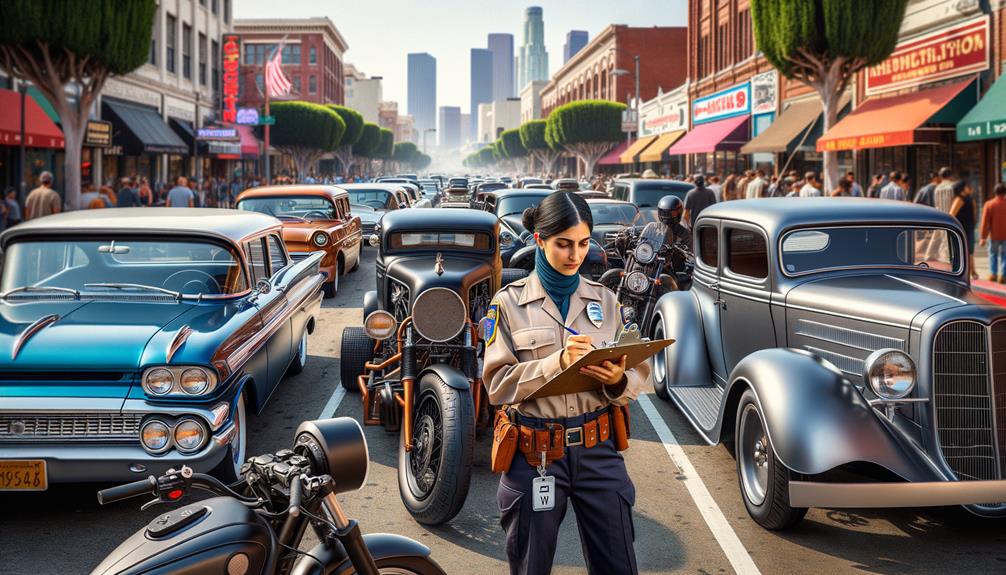
Understanding special vehicle regulations in California is key as they encompass rules for various vehicle categories, including junk and salvage vehicles. These regulations ensure that all vehicles meet safety and registration standards set by the state. Here's what you need to know:
- VIN Inspections: Required for junk and salvage vehicles as per VC § 5505 and § 11519. This ensures that the vehicle's identification numbers are verified against national databases.
- Nonrepairable Vehicle Certificate: Issued for vehicles that can't be restored to a safe operating condition, according to VC § 432 and § 11515.2.
- Branded Titles: Vehicles with branded titles, such as lemon law buybacks, must adhere to specific regulations under VC § 4453 and § 11713.12 for registration and ownership transfers.
- Transporting Vehicles: Licensing requirements for transporting vehicles are detailed in VC § 645, crucial for businesses involved in vehicle logistics.
Being aware of these special vehicle regulations helps you navigate the complexities of owning and operating vehicles in California, ensuring compliance and safety on the roads.
VIN Verification Process Details
To initiate the VIN verification process in California, you must undergo a physical inspection of your vehicle at an authorized location. This typically includes a DMV office or a designated VIN test center. During the inspection, they'll check your VIN number, odometer reading, body type, and emissions label.
After the physical inspection, if everything checks out, you'll receive a REG 31 form. This document is crucial for your vehicle registration with the DMV. Be sure to keep it safe, as losing it or letting it exceed 30 days from issue means you'll need to do the verification all over again, and that might cost you extra.
For a smooth VIN verification process, bring all necessary documents. This includes your identification and any DMV-required paperwork. Having everything ready can significantly expedite your visit.
